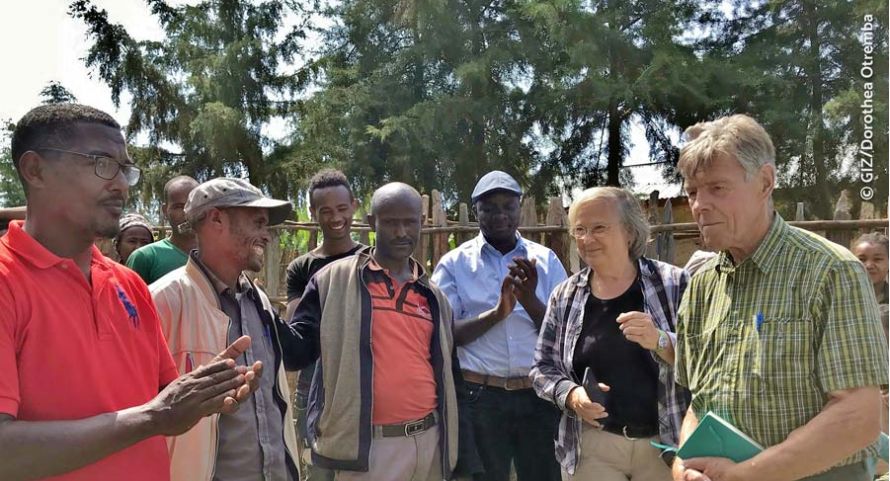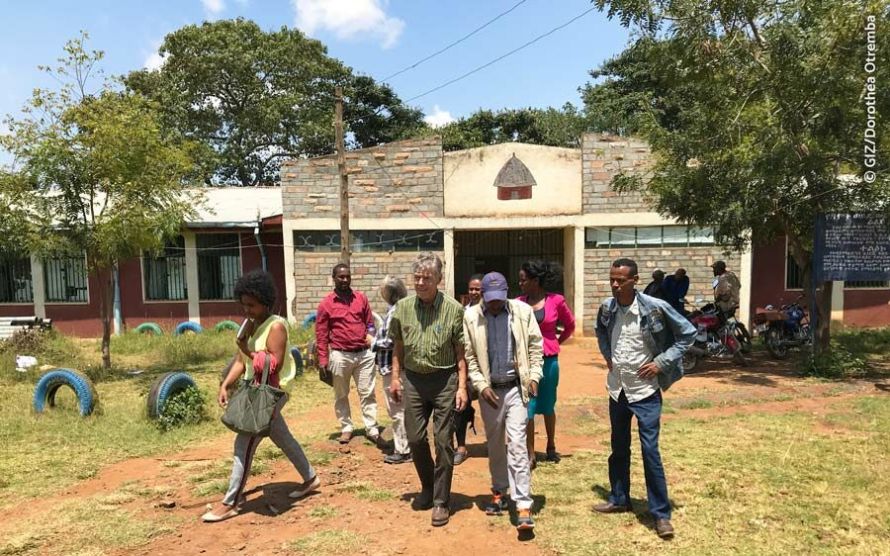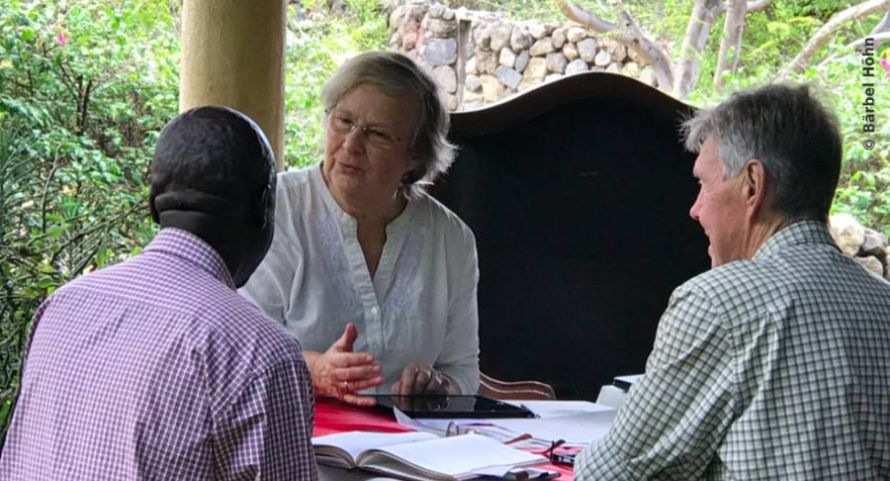Interview
31 August 2021
Energy is the key to regional value creation

Since its announcement by Federal Minister Dr. Gerd Müller in 2017, the initiative, Green People’s Energy for Africa, has launched numerous projects in nine focus countries in sub-Saharan Africa. The two BMZ Special Representatives for Energy in Africa, Bärbel Höhn and Josef Göppel, play a special role in this regard: the initiative benefits from their many years of political experience and expertise in citizen-based renewable energy. In this interview, they discuss their voluntary commitment, why rural Africa should no longer remain a blank spot when it comes to energy supply, what distinguishes this initiative from others in the energy and development space, and achievements made so far.
The initiative Green People’s Energy for Africa wants to promote a decentralised, citizen-based energy supply in rural areas of sub-Saharan Africa. Why is this so important?
Bärbel Höhn: In many African villages, people must rely on candles and firewood as energy resources, and some may also have a diesel generator at their disposal. Without modern energy, they are deprived of economic development.
Josef Göppel: There is also the lack of opportunities in rural areas. Many young people are leaving for the growing cities. The rural exodus intensifies the problems of the countries and this also has an impact on us in Europe. In Monnon, a village in Benin, young men told me that if their cattle starve and they don’t get electricity, they will leave for Europe.
Bärbel Höhn: Our economic wealth in Europe relies on our energy supply. With modern energy, Africans could also set up craft businesses and enterprises, irrigate their fields, dry vegetables and fruits, process them, and thus create jobs. Energy is the key to regional value creation and higher incomes. If we want to achieve the Sustainable Development Goals, we must look to SDG 7 (affordable and clean energy) that is a prerequisite to better achieve two thirds of the other SDGs.
Josef Göppel: However, more than 600 million sub-Saharan Africans still have no access to electricity. Rural regions lack a modern energy supply. This now offers African countries the opportunity to leapfrog the fossil fuel era and immediately rely on the energy of the future and thus on renewable energies. We must promote this development.
On behalf of BMZ, GIZ and KfW have been implementing programmes since the end of 2018 to achieve the goals of Green People’s Energy, a citizen-led energy supply in nine countries. Where does the initiative currently stand?
Josef Göppel: In recent years, more than 100 project applications have been submitted to Green People’s Energy under the Small Project Fund. We actively support 20 of them with financial funding. We are pursuing a successful approach in Ethiopia, for example, where coffee can be dried. To do this, one must know that the moisture level should be 14 percent. This is the highest price per kilo. With a solar drying system, this can be set exactly, but not if people have to dry their coffee in the sun, as they would normally do.
Bärbel Höhn: It is important that we promote many, different types of projects and approaches so that we can then look at which technologies, operator models and approaches work well, and which have not been able to establish themselves. One advantage today is that photovoltaic (PV) systems are cheap and flexible, so they can be used for many applications. But they must also be able to be operated reliably and sustainably. That is why we look at which models work well in which region and which do not.
Cooperatives as a form of organisation have a long tradition in Germany. How is it in Africa?
Bärbel Höhn: It varies greatly. In many regions there are cooperative approaches, in others, this has not worked. It makes sense to fold energy projects into existing structures, communities, cooperatives, corporations, or local models. Such decentralised energy systems then need the participation of local people.
Josef Göppel: In one of our water projects in Tanzania at the foot of Mount Kilimanjaro, the cooperative approach works very well. In other areas of the country, people are sceptical about cooperatives, partly because they have been politically imposed on them.
What conditions must be met for projects to take off successfully?
Josef Göppel: There must be an impulse for change. An individual can initiate this, for example, by installing a solar water pump and thus making the benefits visible in the neighbourhood. Or there might be a situation where people are facing an existential challenge because, for example, of scarcity of firewood that leads to conflicts.
Bärbel Höhn: At the same time, governments must provide the necessary structures – for the training of solar technicians and craftsmen who can advise people and install and maintain systems. In addition, standards and quality controls are needed to ensure that only PV modules and solar systems of good quality are marketed. In African markets you find solar modules with a 20-year warranty sticker and the statement that they were produced in Germany, which is by no means the case.
What are the prerequisites for renewable energies to become established in Africa?
Bärbel Höhn: Political will is a prerequisite. Governments must provide the necessary structures such as electricity tariffs, permits and operation of decentralised plants. Part of Green People’s Energy is the training of solar technicians and craftsmen who advise people and the promotion of local companies that can install and maintain systems.
Josef Göppel: The most important task is to train enough young people in renewable energies. As Bärbel Höhn mentioned, they need good framework conditions so that they have access to the new technologies and can invest in the production and marketing of energy in their home countries. It is not us, but them, who form the basis for a sustainable supply. We can support them in this.
Bärbel Höhn: There is also a need for standards and quality controls to ensure that only PV modules and solar installations of good quality are marketed. In African markets, you find solar modules with a 20-year guarantee sticker and the statement that they were produced in Germany, which is by no means the case.

Is there a good example of this?
Josef Göppel: For me, a milestone of Green People’s Energy is the Hai craftsmen’s school in the north of Tanzania. A branch that is specific for solar energy was attached to the agricultural vocational school. This could be a model for others as well, because every district has a similar vocational school.
Bärbel Höhn: In Senegal, we provide solar power to 600 women so that they can grind their grain and create added value; in Uganda, the solar-powered irrigation of the training garden brings more yield and knowledge. Our aim is to use renewable energies to create jobs, increase people’s incomes and – if possible – empower women in the process. We need, above all, the reliability of women if we want to successfully implement a decentralised energy supply in Africa.
Are there other milestones that the project has reached in the meantime?
Bärbel Höhn: In the first phase, we have launched numerous projects with a wide variety of approaches. After two or three years, we will be able to see which ideas are catching on and where we can take further action. However, there are no financing instruments to roll out good pilot ideas on a broad scale. Moreover, after several years of negotiations, we are now close to the goal of launching a foundation with which the German KfW Development Bank can financially support small projects in the area of mini-grids and rural electrification.
Josef Göppel: This success by Bärbel Höhn shows how important it is to carry our issue into politics. Without this, small citizens’ projects in the energy sector have no political lobby. Investors and companies are mainly interested in large-scale projects. That is why GIZ, but also KfW, must support or finance more decentralised projects.
You both act as the Federal Ministry for Economic Cooperation and Development’s (BMZ) Special Representatives for Energy in Africa and support Green People’s Energy. How did the project come about?
Josef Göppel: I have been travelling to Africa regularly since 2006. On my first stop in Kenya, I experienced the plight of people in rural areas and energy poverty. I reported regularly in the CSU parliamentary group. When Gerd Müller, as Federal Minister of the BMZ, wanted to focus on rural Africa, I proposed to him the idea of linking energy cooperatives between Africa and Germany. This then gave rise to Green People’s Energy.
And what is the role of the energy commissioners?
Bärbel Höhn: Josef Göppel and I have been committed to decentralised renewable energy supply for many years and want to strengthen it among the population. That is why we also advocate their participation, for example in the form of energy cooperatives. Many successful initiatives have been founded here in Germany, which now also include municipalities that are energy independent.
Josef Göppel: We now have more than 900 energy cooperatives in Germany. They have had a hard time in recent years for various reasons including federal policy. I have criticised this lack of support several times, because with citizens’ cooperatives we promote value creation locally. In my view, this is an original concern for political conservatives, but is also relevant to African municipalities and village communities. That is why I am not only committed to citizen energy in Germany, but also in Africa.
To what extent can the experiences made in Germany in terms of citizen energy inspire African initiatives – and vice versa? What can African projects implement, and where is this not possible?
Bärbel Höhn: We cannot simply transfer our successful models to Africa, but we can convey the fact that the energy transition in Germany can only succeed together with the local population. Such cross-party cooperation is enormously important for planning and investment security and long-term success, and that economic success is associated with the energy transition for the actors.
Mr Göppel, you were a member of the German Parliament for the CSU for many years, and you, Ms Höhn, were Minister for the Environment and Agriculture in North Rhine-Westphalia. How did this unusual cooperation come about such that you are now both committed to Green People’s Energy?
Bärbel Höhn: It is not that unusual. We have both worked together across party lines in the context of renewable energy policy. There was also a professional closeness we both had to Minister Müller. I was Chair of the Agriculture Committee of the German Parliament; Minister Müller was still State Secretary in the Ministry of Agriculture at that time.
Josef Göppel: And we worked closely together in the Environment Committee of the German Parliament. Over the years, such good trust has developed.
Looking ahead, where will Green People’s Energy be in five years’ time?
Bärbel Höhn: In the next two years, we will look at the countries where, for example, the establishment of decentralised electricity grids in villages has proven successful. It is crucial that the operator models function sustainably. Against the background of this knowledge, 40, 100, or 1000 villages in suitable regions can then be supplied with electricity and productive use.
Josef Göppel: Our goal is to set the initial spark for a multitude of other projects. We need a critical mass so that citizens in Africa – as in Germany – believe in the idea of an energy supply from their own hands and recognise the economic opportunities thanks to successful examples. Politically, we need to support this development until it becomes economically self-sustaining. This is where GIZ plays an important role, because it can promote decentralisation and development on the part of African citizens.
Bärbel Höhn: With the financial instruments then available through KfW, we can promote the development of this critical mass. In my view, GIZ and KfW should work together much more closely. The goal must be for Africans to recognise the advantage of access to electricity, to take their energy supply into their own hands, and to be able to, and willing to do so.



